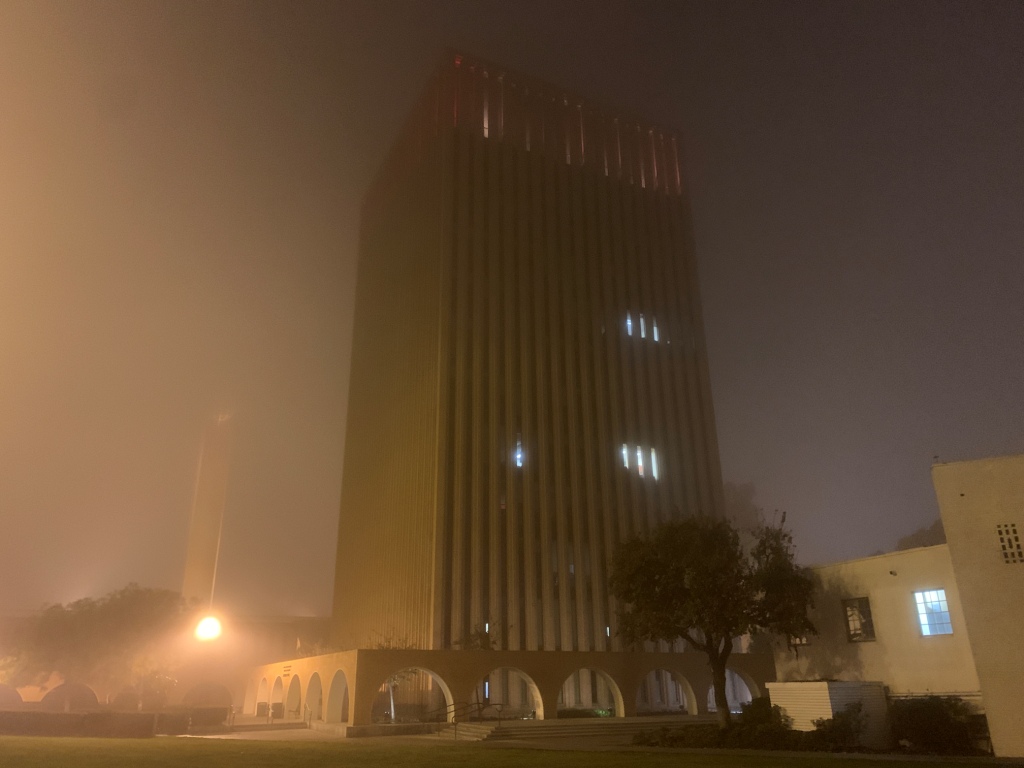
Pullias Center 25th Anniversary Reflections: A Beacon in the Fog
It’s almost midnight as a final figure emerges from Waite Phillips Hall on the USC campus. He would be the last person to be in the offices of the Pullias Center for a while. The governor had just issued a stay at home order that took effect in under an hour.
An unusually low and dense fog had settled in this March evening. He turned for one last look at the building before leaving. Its blocky and imposing design jutted straight into the clouds and, in an almost defiant gesture against the gathering real and metaphorical dark, lit them up. “It looks like a beacon,” he thought to himself, aware of how appropriate that metaphor was.
The Pullias Center turns 25 years old in 2020. That type of milestone alone creates an impetus to reflect on the past. Frame that against a global pandemic crashing over a higher education landscape that was already convulsing from a growing clash of progress and inertia, and the importance of thinking about the future also emerges. What becomes apparent when considering that broad spectrum of time, is that the heart of the Pullias Center is in its mission and the people working there who are dedicated to seeing it to fruition.
Christine Rocha started at the Pullias Center as an undergraduate work-study student in 2014. “I first learned about the Pullias Center for Higher Education as a Manual Arts high school student in the I AM and SummerTIME programs,” she shares. Rocha remembers thinking on her first day that the offices were exceptionally busy for an institution focused on the staid scholarly pursuit of research. “There were a lot of graduate students, staff, and faculty members coming in for meetings. You could sense the shared purpose, and everyone was very welcoming and easy to talk to.”
In 2017, she stepped into her current full-time role at the Pullias Center as a Student Program Advisor. She has helped coordinate the center’s I AM and SummerTIME programs focusing on increasing college access among low-income L.A. Unified high school students by providing them tools and knowledge to ease their transition to college life. “You can tell a lot about the Pullias Center by the strong relationships we all have with one another here,” she reveals. “Our focus on equity pervades throughout everything we do, and I really appreciate the fact that I can learn a lot from another student, staff, or faculty member at any time. It definitely has made an impact in my personal and professional development.”
Maria Romero-Morales joined the Pullias Center as a Research Project Specialist in 2018. A USC person through-and-through, Romero-Morales received her master’s in public administration and a bachelor’s in business administration from USC. Her passion for advocating for underserved, first-generation students and their access to higher education helps her fit right in at the Pullias Center. “I am proud of the commitment every Pullias member has made to improve diversity, equity, and access from K-12 to higher education. Every single person is committed to improving conditions of historically marginalized members of our community. It is hard to not get inspired on a daily basis,” she admits.
If you look near the center of almost any project at the Pullias Center, you will see the fingerprints of Monica Raad. As the Administrative Project Manager, she is responsible for all center financials, budgeting, grant submissions, and logistics. Having been there since 2003, she is one of the center’s longest-running current employees.
She has a particularly fond memory of something told to her by Tierney, the center’s Director at the time, about five years into her job. It was just after the departure of the last student who had been working there when she began. “He told me he always thought about himself as Peter Pan and the rest of us were living in NeverLand – we didn’t grow up and leave, only the students we served would!” From that point forward she thought of herself as part of the Lost Boys. “I love to see the students – whether high school participants or undergrad student workers or doctoral students – join our center, spend some time with us and grow into incredible, confident, knowledgeable, wonderful people.”
As for that sole figure exiting the building on the eve of the coronavirus lockdown, Jonathan Zaleski is one of the more recent additions to the team. In his role as Communications Manager, his primary responsibility is helping to get the Pullias Center’s research and recommendations in front of the higher education community in general, and policymakers and practitioners in particular.
The importance of what the Pullias Center is working to achieve is palpable to Zaleski. “I always feel honored when I find myself at a table with the Pullias Center faculty, who are leaders in their fields in so many ways, getting to participate in what are essentially discussions that could shape the future of higher education.”
From his perspective, each piece of research is a passion project for the team leaders that seeks to make higher education more accessible or successful for very specific populations. “Most of those populations – the underserved, the minoritized, the marginalized – don’t even know we exist,” he points out, ”but we are out there impacting their higher education experience for the better all the time.”
“I believe the Pullias Center is truly a beacon of research and reason on the foggy and shifting landscape of Higher Education,” he concludes, thinking about that March night leaving campus for the last time in too long a time. “I look forward to seeing how the next 25 years turns out.”
Read all of the Pullias Center’s 25th Anniversary Reflections on our website and subscribe to our newsletter to keep up to date on our research.